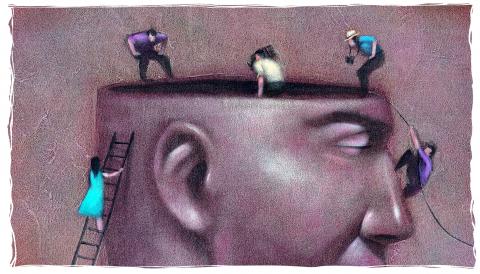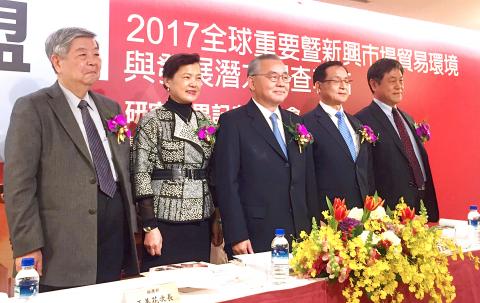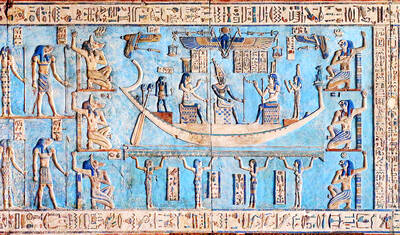Taiwan’s trade competitiveness has fallen for four consecutive years, according to the Importers and Exporters Association of Taipei 2017 Survey on Global Trade Environments and Growth Potential in Key and Emerging Markets, published today.
Out of the 54 countries surveyed, Taiwan is still in the “A list” of “highly recommended” countries in which to trade, although this year Taiwan has fallen to the bottom of the grouping. According to a report by the association, there are three key reasons for the decline: the competitiveness of emerging markets, Taiwan’s low salary environment — which has lead to a talent gap — and an over reliance on the Chinese market.
Taiwan has slipped in all of the survey’s rankings. It is now ranked 13th for competitiveness, while the US pushed Singapore out of last year’s position at the top. Singapore and Germany took second and third place, respectively. On trade liberalization, Taiwan was ranked 18th, with the US, Singapore and the Netherlands taking the top three spots. Taiwan is now ranked 20th for trade convenience and speed, with Singapore, the US and Germany taking first, second and third place.

Graphic: TT
According to the report, the UK’s Oxford Economics forecasts that by 2021 Taiwan will have the most acute brain drain headache of any country in the world.
This article was first published on Feb. 22.
(CNA, translated by Edward Jones)

Photo: CNA
照片:中央社
台灣貿易競爭力連四年下滑。台北進出口公會今發布二0一七年全球重要暨新興市場貿易環境與發展潛力調查報告。
報告指出,台灣雖然位居五十四個貿易地區的A級「極力推薦」區,不過已經是這個等級的最後一名,而導致衰退的三大主因分別為:新興市場競爭力、長期低薪環境人才斷層以及貿易高度依賴中國。
台灣排名全數下滑:國家競爭力排名第十三,美國擠下去年第一名新加坡奪冠,新加坡及德國分居二、三名;貿易自由度台灣排名第十八,前三名為美國、新加坡及荷蘭;貿易便捷度,台灣排名第二十名,前三名為新加坡、美國及德國。
報告指出,根據英國牛津經濟研院發表國際人才報告指出,二0二一年台灣將是全球人才流失最嚴重的國家。(中央社/本文已於二月二十二日刊登)

A: I’m glad that the Grammys will honor the late pop diva Whitney Houston with a Lifetime Achievement Award. Who are this year’s leading nominees? B: Kendrick Lamar is leading the nominations with nine nods, followed by Lady Gaga with seven nods. Bad Bunny, Sabrina Carpenter and Leon Thomas each gained six nods. A: I heard that the song “Golden” from global animated blockbuster KPop Demon Hunters received three nominations, including Song of the Year. B: Blackpink’s Rose and Bruno Mars’ “APT.” also received major recognition with multiple nominations, including Record of the Year, setting a milestone for

It graced statues, colored coffins, and decorated artifacts. It is Egyptian blue, the world’s oldest-known synthetic pigment born in ancient Egypt. Despite its name, it is not limited to a single hue. It ranges from deep blue to greenish tones, often glowing with an almost unearthly brilliance. __1__ In response, the ancient Egyptians developed a synthetic alternative. Not only was it visually striking, but it was also more affordable than imported indigo or natural lapis lazuli. Traces of the pigment have been discovered far beyond Egypt, from wall paintings in Pompeii to tiles in Mesopotamia. However, Egyptian blue began to fall

Bilingual Story is a fictionalized account. 雙語故事部分內容純屬虛構。 Just yesterday, the boy had helped hang the lucky red couplets. Tonight, as firecrackers signaled the New Year, he lay in bed burning with a surging fever. The herbalist checked the boy’s pulse and went still. “The only cure is in the county town across the mountains,” he said. “But the snow is deep, and the shops are shuttered until the Fourth Day.” The boy’s father looked at the window. “I will go.” “The roads are impassable for a cart,” the herbalist warned. “And too far for a man on foot.” The concerned neighbor

Contrary to popular belief, glass bottles may pose a greater microplastic risk than plastic ones. A recent study found that beverages stored in glass bottles can contain up to 50 times more microplastic particles than those in plastic containers. Researchers traced most of the contamination to the paint on the outside of the metal caps. The particles found in the drinks matched the cap’s coating in both color and composition. Experts suggest the issue may result from microscopic scratches that form as caps rub against each other during transport or storage. Such scratches can damage the painted coating, leading